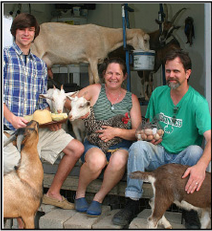This is a Hands-on Two Day Workshop
April 20-21 (Saturday/Sunday), 2013 from 9am to 5pm
State of Maine Cheese Company, Route 1, Rockport, ME
 Bonnyclabber Cheese™ founder Rona Myers Sullivan of Sullivan’s Pond Farm, Inc., will offer a workshop covering the basics of her clabbered milk cheeses and their natural wraps and coverings. Rona will go over the conditions, techniques and troubleshooting methods that she finds crucial to the most consistent rustic fermented milk cheese. You’ll learn about culinary-safe leaf wrapping options and how she macerates them. Rona will share the secrets of her beeswaxing technique and appliques, and how you can make your own grapevine ash in a retort. Bonnyclabber curds take a couple of days to prepare, so they’ll be ready before class for your hands-on shaping, wrapping, ash coating and waxing pleasure!
Bonnyclabber Cheese™ founder Rona Myers Sullivan of Sullivan’s Pond Farm, Inc., will offer a workshop covering the basics of her clabbered milk cheeses and their natural wraps and coverings. Rona will go over the conditions, techniques and troubleshooting methods that she finds crucial to the most consistent rustic fermented milk cheese. You’ll learn about culinary-safe leaf wrapping options and how she macerates them. Rona will share the secrets of her beeswaxing technique and appliques, and how you can make your own grapevine ash in a retort. Bonnyclabber curds take a couple of days to prepare, so they’ll be ready before class for your hands-on shaping, wrapping, ash coating and waxing pleasure!
Space will be limited to this hands-on two day workshop: the first 15 students who send a deposit into our Guild Treasurer will be guaranteed a spot. Additional students may choose to be placed on the waiting list in which case they will need to be prepared to join the class with a few days notice in case of any cancellations.
COST: $150 for Guild members, $175 for non-members (price includes a one year membership to the Guild)
Send your $75 deposit (checks can be made out to the “Maine Cheese Guild”) to guarantee a spot to:
The Maine Cheese Guild
c/o Mark Whitney, Treasurer
Pineland Farms
32 Farm View Drive
New Gloucester, Maine 04260
Continue reading